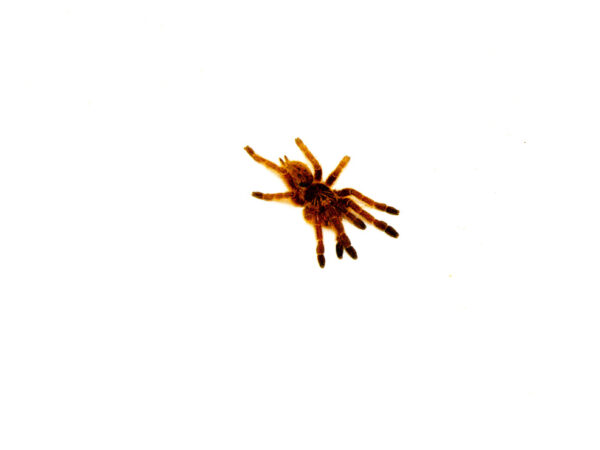Emerald Skeleton Leg Tarantula (Ephebopus uatuman): A Vivid and Burrowing Beauty
The Emerald Skeleton Leg Tarantula (Ephebopus uatuman) is a captivating terrestrial tarantula species native to the Amazon rainforest of northern Brazil. This unique spider is a favorite among hobbyists who admire rare coloration and fascinating behavior. Unlike more docile species, this tarantula is best observed, not handled, making it ideal for keepers who enjoy a display pet with character and flair.
Striking Appearance and Coloration Emerald Skeleton Leg Tarantula (Ephebopus uatuman)
One of the standout features of the Emerald Skeleton Leg Tarantula ) is its iridescent green carapace, contrasted by dark legs that reveal a subtle green shimmer under light. This emerald hue, paired with the “skeleton leg” markings of pale bands on the limbs, gives it an otherworldly appearance.
Key Characteristics:
-
Green to emerald carapace
-
Pale leg markings reminiscent of bones
-
Subtle iridescence visible in bright light
-
Size: 4.5 to 5 inches leg span
While its coloring may not be as bold as some arboreal species, the emerald sheen on this tarantula is uniquely striking in the right conditions.
Behavior and Temperament Emerald Skeleton Leg Tarantula (Ephebopus uatuman)
The Emerald Skeleton Leg Tarantula is known for its defensive nature and speed. It is not recommended for beginners due to its tendency to dart quickly and flick urticating hairs when disturbed.
Typical Behavior:
-
Burrowing and hiding during the day
-
Quick to retreat into its tunnel when threatened
-
Rarely aggressive but very skittish
-
Defensive if cornered or exposed
Although not dangerous to humans, its bite can be painful and is best avoided. This tarantula is best suited for visual appreciation within its enclosure.
Enclosure Setup and Care
A properly set-up enclosure is critical for the health and well-being of an Emerald Skeleton Leg Tarantula (Ephebopus uatuman). As a terrestrial burrower, it requires deep substrate and high humidity to thrive.
Enclosure Requirements:
-
Dimensions: 12″ x 12″ x 12″ minimum
-
Substrate: 5–6 inches of moist coco fiber or peat moss
-
Humidity: 75–85%
-
Temperature: 75–80°F
-
Extras: A cork bark hide, large water dish, and plenty of cover
The species is highly reclusive, often seen only during feeding or nighttime exploration, making a well-structured hideaway essential.
Feeding and Nutrition
The Emerald Skeleton Leg Tarantula is a voracious eater when in feeding mode. It will readily accept a variety of live prey items and demonstrates aggressive feeding behavior.
Diet:
-
Crickets
-
Dubia roaches
-
Mealworms or superworms (for adults)
-
Occasional waxworms or hornworms for variety
Juveniles should be fed twice a week, while adults can be fed once every 7–10 days. Remove uneaten food after 24 hours to prevent stress or mold growth.
Molting and Growth
Like all tarantulas, the Emerald Skeleton Leg Tarantula (Ephebopus uatuman) grows by molting. During this process, it may refuse food, become more reclusive, and lie on its back.
Molting Signs and Care:
-
Refusal to eat for 1–2 weeks before molt
-
Dull coloration or balding
-
Lethargy or slow movement
-
Post-molt: wait 5–10 days before feeding
The growth rate is moderate, with males reaching maturity faster than females. Females can live up to 12–15 years, while males typically live 4–6 years.
Is It Right for You?
The Emerald Skeleton Leg Tarantula is best suited for experienced or intermediate hobbyists who can provide the proper environment and understand its skittish nature. It’s not a handling species but offers a rewarding visual presence, especially when seen climbing or feeding.
Pros:
-
Unique green coloration
-
Fascinating burrowing behavior
-
Active and bold feeder
Cons:
-
Defensive and fast-moving
-
Requires high humidity and deep substrate
-
Rarely visible unless disturbed
Final Thoughts
The Emerald Skeleton Leg Tarantula (Ephebopus uatuman) is a vivid, exotic, and slightly elusive addition to any tarantula collection. With proper care, it will thrive in a well-maintained enclosure and reward its keeper with rare but memorable sightings. If you’re looking for a display tarantula with one-of-a-kind coloration and an adventurous personality, this species is a gem worth having.









Reviews
There are no reviews yet.